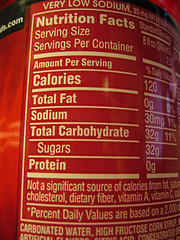New Law Would Modernize Nutrition Labels, Clarify Terms Like “Healthy” & “Natural”

(decaf)
“There should be a simple, standard symbol system that displays calorie information related to a common serving size, and information related to nutrients strongly associated with public health concerns,” reads the Food Labeling Modernization Act of 2013 [PDF], announced today by Representatives Frank Pallone (NJ) and Rosa DeLauro (CT), along with Connecticut Senator Richard Blumenthal. “Consumers should be able to quickly and easily comprehend the meaning of the symbol system as an indicator of a product’s contribution to a healthy diet.”
The law, which revises the Food, Drug, and Cosmetic Act, would require that these new labels be displayed in a consistent position across similar products, thus minimizing companies efforts to hide nutritional info.
It would also make it against the law to label a product using terms like “whole grain,” “multigrain,” or other grain-related descriptors “unless the amount of whole grains, expressed as a percentage of total grains, is conspicuously disclosed in immediate proximity.” The same goes for marketing claims like “whole wheat” or products labeled as “wheat” that contain no whole wheat.
The law would also clarify the use of the term “natural” by making it against the law to forbid that label being used on products that contain “any artificial ingredient (including any artificial flavor or artificial color)”
This includes ingredients that have the same chemical structure as a naturally occurring ingredient but were nonetheless synthesized.
Use of corn syrup, high-fructose corn syrup, high-maltose corn syrup, and other ingredients that have undergone chemical changes but are currently being used in products labeled “natural” would no longer be allowed in products bearing that label.
There is an exception in the law for “food that has undergone traditional processes used to make food edible, to preserve… or make food save for human consumption.” So things like smoking, roasting, freezing, and fermenting can still be involved in products labeled “natural.”
The Act would also require the The Secretary of Health and Human Services to revise the standards used in the existing law for the term “healthy” on food labeling, to take into account the extent to which an item contains added sugars or whole grains.
“In the case of a food that contains grains, in revising such regulations, the Secretary shall not consider the food to be ‘healthy’ unless at least half of those grains, by weight, are whole grains,” reads the new act.
In addition, the bill would require the disclosure of the amount of caffeine in a product if it exceeds 10 milligrams.
“While caffeine may be listed as an ingredient, consumers may not know exactly how much caffeine they’re really drinking or eating,” explains Ami Gadhia, senior policy counsel for or cohorts at Consumers Union, which was on hand with the lawmakers for today’s announcement. “As Consumer Reports testing has found, the labeling isn’t always clear, especially when it comes to products like energy drinks. This bill would outline it for consumers before they take a sip.”
Those behind the bill say it’s time for food labeling to step into a new age of transparency.
“Childhood obesity has nearly tripled in the past 30 years and is a huge public health problem in this country that puts millions of American children at risk. Healthy eating is critical to combating this epidemic. That is why it is so important that when families make the effort to eat nutritious, healthy food, the labels on food products help them make the right choices—not confuse or mislead them,” said Congressman Pallone in a statement. “The Food Labeling Modernization Act is a comprehensive approach to updating labels so that consumers have the clear, consistent information they need when making important decisions about the food they buy and give to their families.”
Adds Gadhia, “Many of the labels on food currently don’t give consumers all the information they need to make informed decisions about the food they buy. This legislation would take a big, common sense step forward in improving the nutrition information available about the food that consumers are putting in their carts and on their kitchen tables.”
Want more consumer news? Visit our parent organization, Consumer Reports, for the latest on scams, recalls, and other consumer issues.

